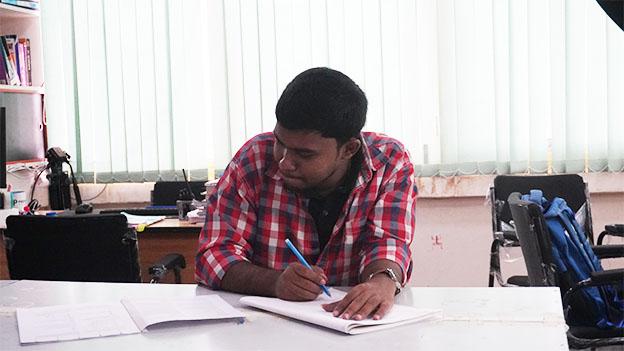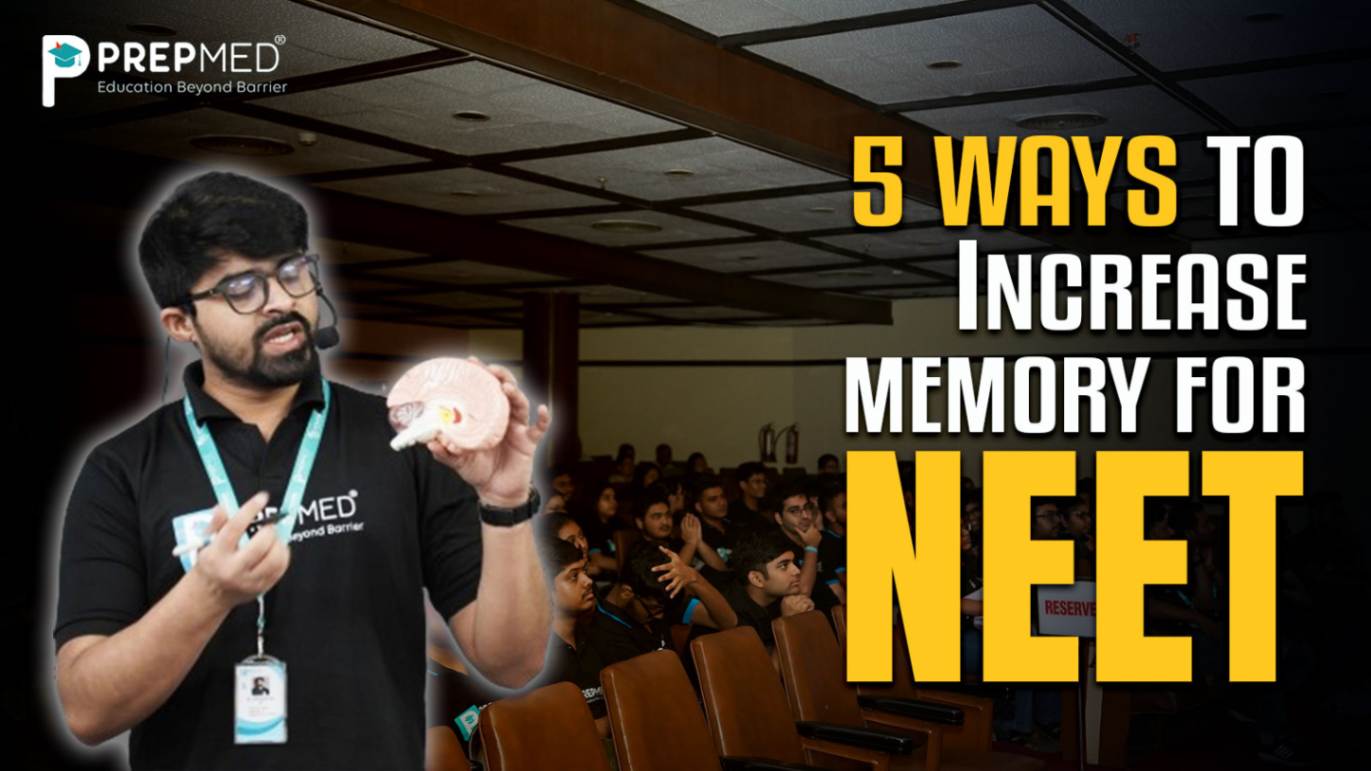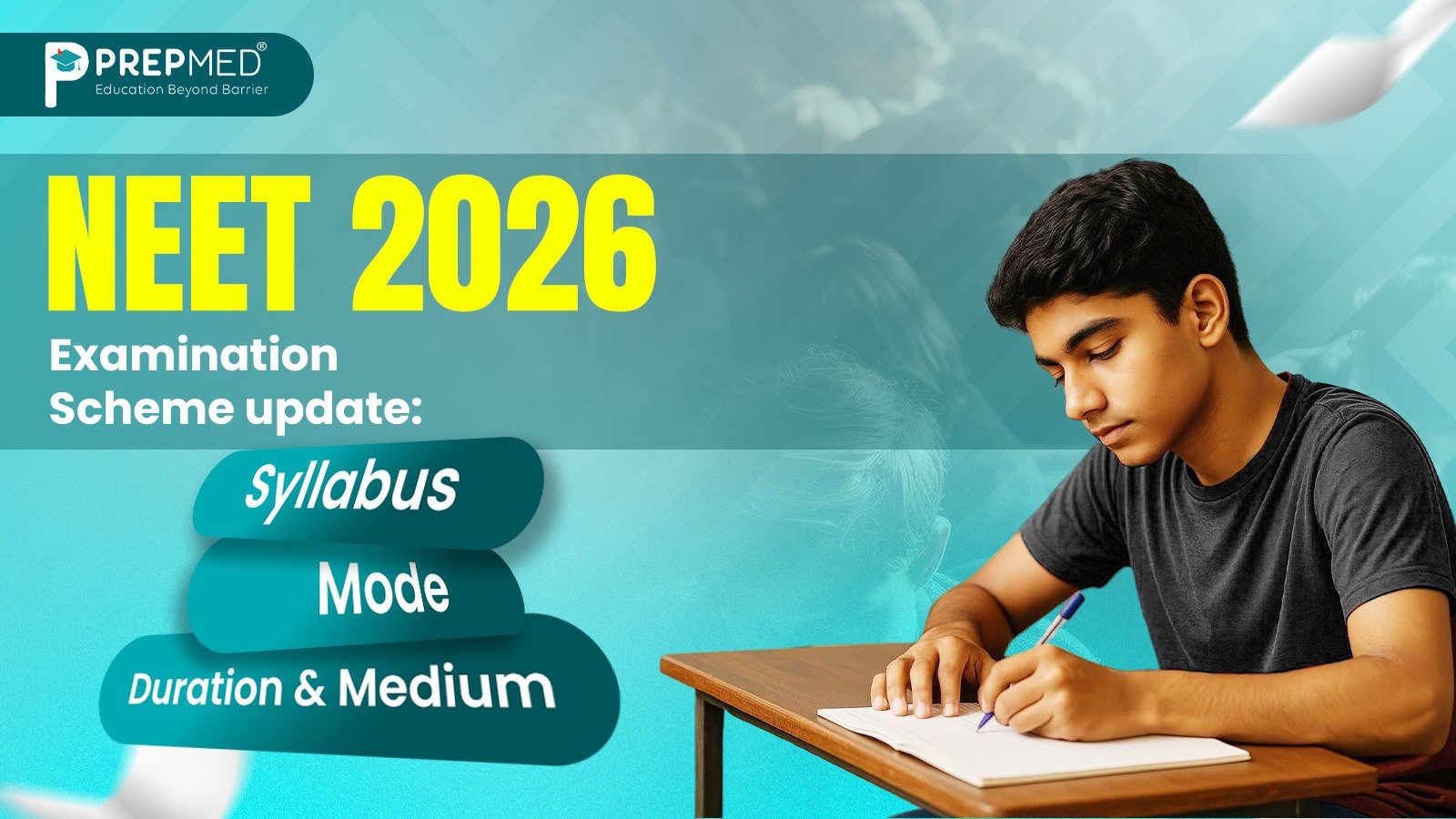September 02, 2024
5 Ways to Increase Memory for NEET
National Eligibility cum Entrance Test (NEET) is a tough exam to crack for pursuing an undergraduate medical career. It covers Physics, Chemistry, and Biology comprising a vast range of topics that require transparent understanding. To get a higher rank in the exam, NEET aspirants must have a clear understanding of every topic. So, to improve cognitive ability, especially memory to excel in the NEET exam significantly, PrepMed mentors suggest 5 important ways that are listed below.
Learning technique:

PrepMed mentors have constructed creative and interesting methods to aid NEET aspirants in grasping complex subject matter easily. They use mnemonics, acronyms, and visual imagery that make learning more engaging. Additionally, they recommend using the method of loci, associating key details with familiar places.
PrepMed experts stress the importance of leveraging this technique whenever possible for better memorization. Creating mental images and narratives to understand and retain complex topics is also highly encouraged among NEET aspirants.
Spaced repetition:
NEET syllabus contains topics that are critical and need proper understanding. To score high in the NEET exam, PrepMed mentors ask students to regularly take a look at important and commonly asked topics at regular intervals with an increased frequency of revision. Spaced repetition is also possible with flashcards containing formulas, reactions, diagrams, images, etc. In addition, PrepMed mentors also believe in incorporating mind mapping or different visualization techniques during preparation for better recalling ability.
Even PrepMed has an app that can be used by the students to employ the algorithms for spaced repetition and augmenting the chance of developing a better memory. Hence, a daily recap of studied materials for a maximum of 30 minutes and reviewing them before the day ends, can increase their sustenance.
Active recall & retrieval:
Joining a study group and explaining what you’ve learned to your peers is a powerful way to reinforce information and boost long-term retention. PrepMed mentors emphasize the importance of regularly participating in mock exams as a key strategy for developing a thorough understanding of the syllabus. To help students strengthen their memory, PrepMed offers revision classes and conducts subject-specific and full-length mock exams in controlled, exam-like surroundings per week.
Mentors also provide practice question papers to help students regularly review what they’ve learned and pinpoint areas that need improvement. Scientific studies have shown that mock exams and practice sessions are effective retrieval practices, enhancing student's ability to recall complex information during stressful exams.
Mindfulness & meditation:
Different contemporary scientific studies proposed that practicing mindfulness and meditation regularly by students intensifies psychological well-being and cognitive ability. It helps students cope with exam stress, undue anxiety, and frustration of not doing well, and grasp more knowledge. As a result, it improves concentration and helps the aspirants live in the moment with a more refined information processing, thinking, reasoning, problem-solving, and memorization ability.
Mentors of PrepMed assist NEET aspirants with necessary daily study schedules for practicing mindfulness and having enough breaks to avoid burnout.
Healthy lifestyle:

Food consumption plays a big role in the brain's capacity and cognitive function. A balanced diet rich in nutrients like fish, nuts, vegetables, and fruits can significantly enhance the ability to memorize information. Omega-3, in particular, is proven to be highly effective in supporting better cognitive function.
PrepMed mentors also emphasize the importance of getting 7 to 8 hours of good sleep each night, as scientific studies show that sleep is crucial for memory consolidation. Additionally, regular exercise, such as a 30 to 40-minute brisk walk in nature, can further boost memory.
PrepMed mentors believe that maintaining a healthy body and mind is key to enhancing cognitive abilities for NEET aspirants. By integrating these strategies—eating well, sleeping enough, and staying active—students can not only improve their cognitive abilities but also develop a stronger interest in their studies and feel more motivated to work harder.
Frequently Asked Questions (FAQs)- Increase Memory for NEET
1. Why is memory so important for NEET?
Memory is crucial for recalling formulas, concepts, and information from the vast syllabus. It helps you answer questions accurately and efficiently during the exam.
2. Can anyone improve their memory?
Yes, with consistent effort and the right techniques, anyone can enhance their memory. It's a skill that can be developed over time.
3. What is the best way to study for NEET to improve memory?
A combination of active recall, spaced repetition, and mnemonics can be highly effective.
4. How does active recall help in memorization?
Active recall involves testing yourself on information regularly. This forces your brain to retrieve information from long-term memory, strengthening the neural connections.
5. What are some effective mnemonics for NEET?
Acronyms, acrostics, and visualization techniques can help remember lists, sequences, and complex concepts.
6. Does sleep play a role in memory improvement?
Yes, sleep is essential for consolidating memories. Lack of sleep can impair memory and concentration.
7. How can exercise benefit memory?
Regular exercise increases blood flow to the brain, promoting the growth of new brain cells and enhancing cognitive function.
8. Is diet important for memory?
A balanced diet rich in nutrients like omega-3 fatty acids, antioxidants, and vitamins can support brain health and memory.
9. How can I avoid forgetting information after studying?
Consistent review and practice are key. Regularly revisit previously learned material to reinforce your memory.
10. What should I do if I find it difficult to concentrate while studying?
Try creating a conducive study environment, taking short breaks, and practicing mindfulness techniques to improve focus.
For more details on PrepMed and to find the nearest coaching center, visit PrepMed’s official website
Follow Us - on Facebook /Instagram/ YouTube






